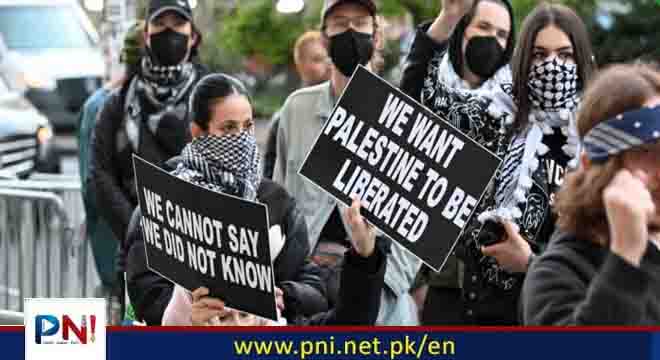UNITED NATIONS, Oct 05 : Universities around the world must respect peaceful activism and revise repressive policies targeting the pro-Palestinian solidarity movement on their campuses, a UN independent human rights expert said on Friday.
Gina Romero, Special Rapporteur on the rights to freedom of assembly and association, warned that “the brutal repression of the university-based protest movement is a profound threat to democratic systems and institutions.”
Furthermore, “it risks alienating an entire generation, damaging their participation and perception of their role in democratic processes, in addition to failing the responsibility to prevent atrocity crimes and to contribute to peace.”
International solidarity movements in support of the Palestinian people, including their right to self-determination, have increased since the start of the war in Gaza nearly a year ago this month.
Mass demonstrations and protests, as well as occupations, encampments and other types of peaceful assembly have taken place across the world, especially in western countries, with many protests being led by university students.
“After reviewing persistent allegations, and talking with around 150 people from 30 countries, including students and faculty members, I can conclude that the situation surrounding protests and international solidarity with the Palestinian people and victims within university environments, coupled with inadequate institutional responses, reveals a widespread hostile environment for the exercise of the rights to freedom of peaceful assembly and association,” Ms. Romero said.
With students now back from end of year vacations, peaceful assemblies have resumed on campuses worldwide, “re-joining the growing global movement to safeguard Palestinian rights and lives, and anticipating commemoration mobilisations by both Israeli and Palestinian solidarity groups in October.”
She issued six recommendations for academic institutions, urging them “to recognize and respect the importance of youth meaningful and free engagement, and their valuable contributions for human rights, dignity, peace, and justice, including through exercising their public freedoms”.
It is crucial to “immediately cease the stigmatization and hostilities that silence members of the academic community and discourage the exercise of their rights,” she continued.
Universities must also “actively facilitate and protect peaceful assemblies, including by prioritising negotiation and mediation where necessary, and refrain from calling on law enforcement to disperse peaceful protests”.
They should also refrain from and cease any surveillance and retributions against students and staff for expressing their views or participating in peaceful assemblies.
Ms. Romero further called for ensuring transparent and independent investigation into human rights violations that occurred in the context of camps and other peaceful assemblies, and revoking sanctions related to the exercise of fundamental freedoms. In this regard, affected students and staff should also be provided effective and full remedies.
Finally, academic institutions must ensure that their regulations are in line with international standards.
The rights expert stressed that universities and other educational institutions have an important “window of opportunity” to learn from the experiences of the university-based pro-Palestine solidarity movement and repair the harm.
“They must recognize that their responsibility extends beyond campus borders – their actions have the potential to shape political discourse, culture, civic education, and ultimately, the future sustainability of democracy, freedoms and human rights,” she said.
“Respecting and guaranteeing dissent is essential to ensure the universities remain spaces for free thought, speech and academic freedom, as well to guarantee freedom of expression, assembly and association.”
Follow the PNI Facebook page for the latest news and updates.









